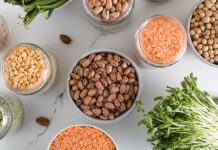
Shelf-stable and frozen foods have dominated shopping carts for the past several weeks as consumers have sought to both stock up on essentials and reduce the number of trips they take to the grocery store. While most of the reports have shown growth in convenience and comfort foods (e.g., frozen pizza), new data from Nielsen suggests this trend extends to produce as well.
For the year-to-date period ending April 4, the growth in frozen and shelf-stable produce categories outpaced growth in fresh produce.
Fruit
- Frozen +24%
- Shelf-stable +17%
- Fresh +5%
Vegetables
- Frozen +19%
- Shelf-stable +32%
- Fresh +10%
Nielsen notes that produce — in its canned, bottled, and frozen variants — is ideal for consumers who want healthy foods that are also shelf-stable. They gave the example of pineapple, for which fresh sales are down (-3%), while frozen (+39%) and shelf-stable (+29%) are up year-over-year.
For companies looking to benefit from this shift even after the pandemic, the trick, Nielsen suggests, will be education in the form of “guidance and inspiration” into how to use the products as well as “reminding and encouraging the regular use of the produce they’ve stored.” This will “transform the trial that has taken place in this time of emergency into longer-term habits and use cases for canned or frozen goods.”
For more on the latest consumer buying patterns, read Tracking Consumer Demands During COVID-19.




![[Report] 2025 Consumer Food Trends](https://foodindustryexecutive.com/wp-content/uploads/2025/01/2025-Consumer-Trends-Report_-From-Price-to-Purpose-218x150.jpg)


